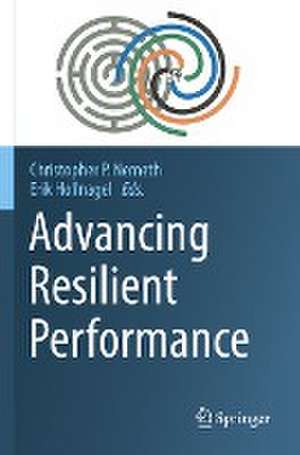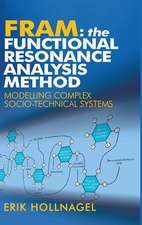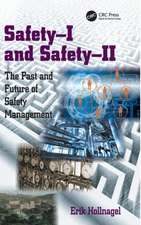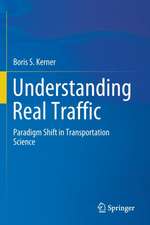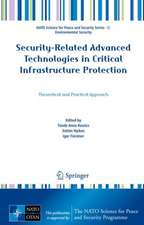Advancing Resilient Performance
Editat de Christopher P. Nemeth, Erik Hollnagelen Limba Engleză Paperback – 13 oct 2022
Resilience Engineering (RE) studies have successfully identified and described many instances of resilient performance in high hazard sectors as well as in the far more frequent cases where people and organisations cope with the uncertainties of daily operations. Since RE was first described in 2006, a steady accumulation of insights and efforts have provided the basis for practical tools and methods. This development has been documented by a series of texts in the Resilience Engineering Perspectives series as well as by a growing number of papers and reports.
This book encapsulates the essential practical lessons learned from the use of Resilience Engineering (RE) for over ten years. The main contents are a series of chapters written by those who have been instrumental in these applications. To increase the value for the reader, each chapter will include: rationale for the overall approach; data sought and reason(s) for choosing; data sources used, data analyses performed, and how recommendations were made and turned into practice.
Serving as a reference for practitioners who want to analyse, support, and manage resilient performance, this book also advances research into RE by inquiring why work goes well in unpredictable environments, to improve work performance, or compensate for deficiencies.
| Toate formatele și edițiile | Preț | Express |
|---|---|---|
| Paperback (1) | 721.01 lei 6-8 săpt. | |
| Springer International Publishing – 13 oct 2022 | 721.01 lei 6-8 săpt. | |
| Hardback (1) | 726.85 lei 6-8 săpt. | |
| Springer International Publishing – 12 oct 2021 | 726.85 lei 6-8 săpt. |
Preț: 721.01 lei
Preț vechi: 879.28 lei
-18% Nou
Puncte Express: 1082
Preț estimativ în valută:
137.96€ • 144.04$ • 114.18£
137.96€ • 144.04$ • 114.18£
Carte tipărită la comandă
Livrare economică 04-18 aprilie
Preluare comenzi: 021 569.72.76
Specificații
ISBN-13: 9783030746919
ISBN-10: 3030746917
Pagini: 158
Ilustrații: XIII, 158 p. 21 illus., 8 illus. in color.
Dimensiuni: 155 x 235 mm
Greutate: 0.25 kg
Ediția:1st ed. 2022
Editura: Springer International Publishing
Colecția Springer
Locul publicării:Cham, Switzerland
ISBN-10: 3030746917
Pagini: 158
Ilustrații: XIII, 158 p. 21 illus., 8 illus. in color.
Dimensiuni: 155 x 235 mm
Greutate: 0.25 kg
Ediția:1st ed. 2022
Editura: Springer International Publishing
Colecția Springer
Locul publicării:Cham, Switzerland
Cuprins
From Resilience Engineering to Resilient Performance.- Development of Resilience Engineering on Worksites.- Fatigue Risk Management System as a practical approach to improve resilience in 24/7 operations.- Using the Resilience Assessment Grid to Analyse and Improve Organisational Resilience of a Hospital Ward.- Learning from Everyday Work: Making organisations Safer by Supporting Staff in Sharing Lessons about Their Everyday Trade-offs and Adaptations.- Reflections on the Experience of Introducing a New Learning Tool in Hospital Settings.- Resilient Performance in Aviation.- Assessing the impacts of ship automation using the Functional Resonance Analysis Method.- A Methodological Framework for Assessing and Improving the Capacity to Respond to the Diversity of Situations that May Arise.- Addressing structural secrecy as a way of nurturing resilient performance.- The 2nd Step: Surprise Is Inevitable. Now What?.- Epilogue: Quo Vadis?
Notă biografică
Christopher Nemeth conducts human performance research and development in high hazard sectors as a Principal Scientist with Applied Research Associates, a 1400 member U.S. science and engineering consulting firm. His 26-year academic career has included seven years in the Department of Anesthesia and Critical Care at the University of Chicago Medical Center, and adjunct positions with Northwestern University’s McCormick College of Engineering and Applied Sciences, and Illinois Institute of Technology. He has served as a committee member of the National Academy of Sciences, is author/editor of five books, and is widely published in technical journals.
Erik Hollnagel is Senior professor of Patient Safety at Jönköping University (Sweden), Visiting Professorial Fellow, Macquarie University (Australia), and Visiting Fellow, Institute for Advanced Study, Technische Universität München (Germany). He is also Professor Emeritus from Linköping University (Sweden), Ecole des Mines de Paris (France), and the University of Southern Denmark. Erik has throughout his career worked at universities, research centres, and with industries in many countries and with problems from a variety of domains and industries. He has published widely and is the author/editor of 26 books, including six books on resilient health care, as well as a large number of papers and book chapters.
Textul de pe ultima copertă
Resilience Engineering (RE) studies have successfully identified and described many instances of resilient performance in high hazard sectors as well as in the far more frequent cases where people and organisations cope with the uncertainties of daily operations. Since RE was first described in 2006, a steady accumulation of insights and efforts have provided the basis for practical tools and methods. This development has been documented by a series of texts in the Resilience Engineering Perspectives series as well as by a growing number of papers and reports.
This book encapsulates the essential practical lessons from the use of Resilience Engineering learned for more than the previous ten years. The main contents are a series of chapters written by those who have been instrumental in these applications. To increase the value for the reader, each chapter will include: rationale for the overall approach; data sought and reason(s) for choosing; data sources used, data analyses performed, and how recommendations were made and turned into practice.
Serving as a reference for practitioners who want to analyse, support, and manage resilient performance, this book also advances research into RE by inquiring why work goes well in unpredictable environments, improving work performance, or compensating for deficiencies.
Caracteristici
Focuses on the development of resilience engineering (RE) as a concept and a field of practice that has contributed to expanding the scope of safety from a preoccupation with failure, to also include the acceptable everyday functioning of a system or an organisation Includes case studies that translate RE concepts into practice and demonstrates RE's practical value to researchers, operators, and managers using life experience Written in an accessible style to enable those who are new to RE to easily understand concepts and appeal to new practitioners and students
